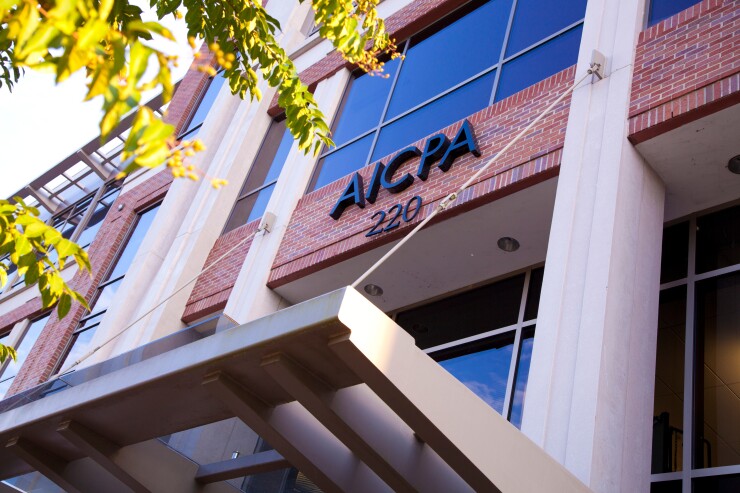AICPA calls on IRS to reallocate extra $80B to taxpayer service

The American Institute of CPAs is advocating for the Internal Revenue Service to devote more of the extra $80 billion in funding that it’s receiving over 10 years under the Inflation Reduction Act to provide better service to taxpayers and tax professionals.
The majority of the $80 billion is dedicated to improving tax enforcement to collect more tax revenue, especially from large corporations and high-income individuals, prompting complaints from Republican lawmakers that it would be used to hire an army of IRS agents to pursue innocent taxpayers. But as in a recent blog post from National Taxpayer Advocate Erin Collins, the AICPA is urging the IRS to reallocate more of that funding toward helping taxpayers as well as tax practitioners. In her blog post, Collins pointed out that only 10% of the extra $80 billion is designated as going toward taxpayer service and IT modernization.
Given the historic low levels of IRS taxpayer services, the AICPA said it’s concerned there was an insufficient allocation of funding in the IRA to improve taxpayer services to appropriate levels. The AICPA is also concerned that service challenges will persist unless sufficient, targeted funding for technology improvements, human talent and training, and taxpayer services are appropriated.

“AICPA is pleased to see that Congress has made a significant investment in critical IRS divisions,” wrote AICPA Tax Executive Committee chair Jan Lewis. “However, given the historic low levels of IRS taxpayer services, we are concerned that there was an insufficient allocation of funding in the IRA to improve taxpayer services to appropriate levels. We are concerned that service challenges will persist unless sufficient, targeted funding for technology improvements, human talent and training, and taxpayer services are appropriated.”
The AICPA believes it’s also critical that the IRS continues to address and eliminate its processing backlog, which the IRS says it has mostly cleared this year, thanks to the extra funding from the IRA. The Institute also suggested the IRS clearly communicate to the public, in a timely manner, the status of all IRS operations, continue the suspension of certain automated collection notices until the IRS is better prepared to devote the necessary resources for a proper and timely resolution of the matters, as well as offer a reasonable cause penalty waiver due to the COVID-19 pandemic and its lingering impact on IRS operations, similar to the procedures of “first time abate” administrative waiver, without affecting a taxpayer’s eligibility for the first time abate in future tax years for all penalties with respect to all type of returns and payments.
The AICPA noted that it has previously raised concerns regarding how the IRA allocates the additional funds appropriated to the IRS, particularly the allocation of $45.6 billion toward enforcement and only $3.1 billion to service. It said the IRS could mitigate some of this imbalance by paying for enforcement-related service out of IRA enforcement funding. The letter cited several examples, including:
- The cost of the recruitment, development and retention of a quality workforce within an enforcement context;
- The development of the appropriate service and technology infrastructure to support its enforcement initiatives and fund that infrastructure out of enforcement appropriations; and,
- The expenses related to enforcement activities supported by customer service, like the automated collection customer service representative answering taxpayer and practitioner phone calls.
The AICPA suggested the IRA plan should include a comprehensive IRS customer service strategy that’s supported by resources to provide taxpayers and practitioners with access to empowered employees, timely information and tailored resources. The IRS’ plan for training should also include customer-focused subject matters, a consistent and high-quality format and the leveraging of trained employees, the AICPA noted. The IRS should also include a comprehensive plan to redesign the organization which should incorporate a customer-focused culture, provide an integrated technological infrastructure and create a dedicated Practitioner Services Division.
Finally, to enable the IRS to achieve the improvements required for a 21st century tax administration system, the AICPA noted the IRS needs a modern technological infrastructure.
In the letter, the AICPA expressed concern with the current allocation of resources, which it said are based on the current levels of IRS taxpayer service.
“Taxpayers’ and practitioners’ experiences with the IRS over the last three years demonstrate the need for additional focus on customer service,” Lewis wrote. “We understand that enforcement is an important aspect of the responsibilities of the IRS and critical to a voluntary compliance tax system. However, we believe there is an imbalance in the allocation of funds between enforcement and service. We understand what is working and not working with tax administration from both taxpayer and practitioner perspectives. As one of the IRS’s most significant stakeholders, AICPA is both poised and committed to being a key resource to IRS regarding allocation of the $80 billion.”


